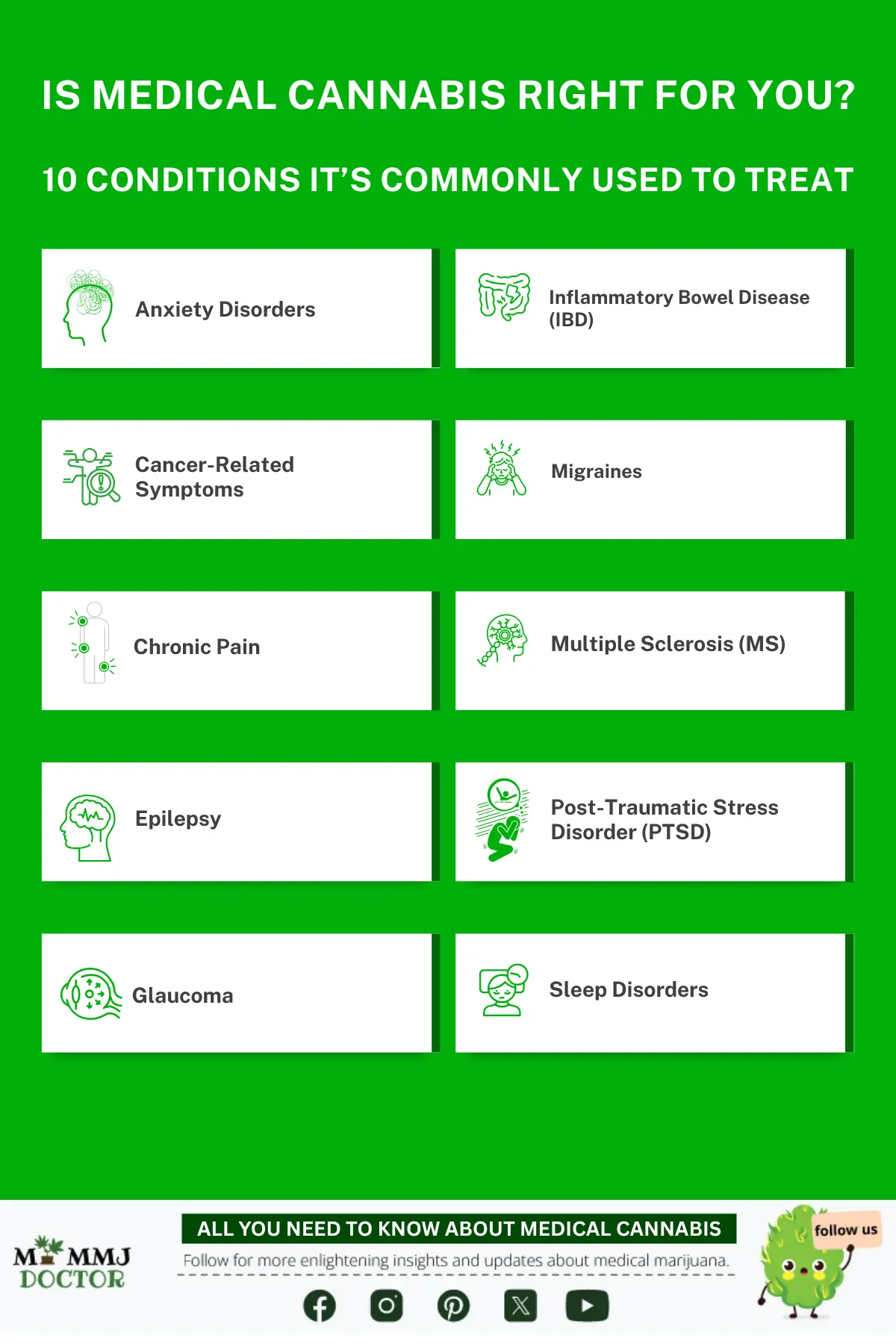Medical cannabis has moved from the margins into the heart of modern healthcare. More people than ever are turning to it as a natural option for relief, especially when conventional treatments fall short. In many parts of the world, it is now legal, medically approved, and carefully regulated. As awareness grows, so does the curiosity around its uses.
But what exactly is cannabis being used to treat?
In this article, we’ll explore the most common medical conditions treated with medical cannabis. Whether you’re exploring alternatives for yourself or simply want to stay informed, this guide offers a clear and trusted starting point.
How Medical Cannabis Works?
Medical cannabis works by interacting with the body’s endocannabinoid system, which helps regulate pain, mood, sleep, and inflammation. The plant contains compounds called cannabinoids that mimic the ones our bodies naturally produce.
The two most studied cannabinoids are:
- THC: Known for its “high,” it also relieves pain, nausea, and boosts appetite.
- CBD: Non-intoxicating and commonly used for anxiety, inflammation, and seizures.
Understanding these compounds is a great first step. If you’re curious, check out our guide comparing THC and CBD to learn more about their unique benefits.

Top 10 Conditions Treated with Medical Cannabis
Medical cannabis is gaining attention for more than just buzz—it’s becoming a real source of relief for people facing challenging health conditions. Let’s explore the most common ones where cannabis is making a difference.
1. Anxiety Disorders
Can medical cannabis help reduce anxiety?
Yes, in many cases, it can. Some patients find that medical cannabis, especially strains high in CBD, helps ease symptoms of anxiety and stress. It may promote relaxation, improve sleep, and reduce racing thoughts. However, everyone responds differently, so it’s important to work with a healthcare provider to find the right balance.
2. Cancer-Related Symptoms
How does cannabis help people living with cancer?
Medical cannabis is often used to manage nausea, appetite loss, and pain that come with cancer treatments like chemotherapy. THC can help with nausea and increase appetite, while CBD may offer pain relief and reduce inflammation. For many, it adds comfort and improves daily quality of life.
3. Chronic Pain
Is chronic pain one of the main reasons people use medical cannabis?
Absolutely. Chronic pain is one of the top conditions for which cannabis is prescribed. Whether it’s caused by arthritis, back injuries, or nerve damage, cannabinoids can help manage the discomfort. Cannabis works by interacting with pain receptors in the brain, potentially reducing the need for strong pharmaceuticals.
4. Epilepsy
Can cannabis help control seizures in epilepsy patients?
Yes, particularly in cases of treatment-resistant epilepsy. CBD-based medications like Epidiolex have shown positive results in reducing the frequency and intensity of seizures. Families and patients dealing with severe forms, such as Dravet syndrome, have reported life-changing outcomes.
5. Glaucoma
Is cannabis still used to manage glaucoma?
In some cases, yes. Cannabis may help reduce intraocular pressure in the eye, which is the primary concern in glaucoma. While it’s not a cure, some patients use it as a complementary option alongside traditional treatments. However, newer medications may work longer, so cannabis is typically not the first choice today.
6. Inflammatory Bowel Disease (IBD)
Can cannabis ease symptoms of Crohn’s and ulcerative colitis?
It can. Some patients report reduced inflammation, fewer flare-ups, and better digestion. Cannabis may help calm the overactive immune response that causes IBD symptoms. While more research is ongoing, many find it improves appetite, pain levels, and overall gut comfort.
7. Migraines
Is medical cannabis effective for migraine relief?
For some people, yes. Cannabis may reduce both the frequency and intensity of migraines. It can also help relieve associated symptoms like nausea and light sensitivity. Some patients use it at the onset of a migraine for quicker relief, while others use it preventatively.
8. Multiple Sclerosis (MS)
How does cannabis help people with MS?
Medical cannabis may reduce muscle spasms, stiffness, and pain caused by MS. THC and CBD both play a role in calming nerve signals, which helps ease discomfort and improve mobility. Many MS patients report improved sleep and a better ability to manage daily tasks.
9. Post-Traumatic Stress Disorder (PTSD)
Can cannabis support those living with PTSD?
Yes. Cannabis is increasingly being used to help manage symptoms of PTSD, especially in veterans and trauma survivors. It may reduce flashbacks, anxiety, and insomnia, allowing people to regain a sense of control. However, careful use is crucial, and support from a mental health professional remains essential.
10. Sleep Disorders
Can cannabis help with sleep issues like insomnia?
Many patients use medical cannabis to fall asleep faster and stay asleep longer. THC may shorten the time it takes to fall asleep, while CBD can promote calmness without the high. It’s often used as a natural alternative to prescription sleep aids, especially when those come with unwanted side effects.
Is Medical Cannabis Safe for Everyone?
You might be wondering, is medical cannabis safe for all conditions? The answer isn’t a simple yes or no. While many people find relief using cannabis for conditions like anxiety, chronic pain, epilepsy, and migraines, it’s important to remember that it’s not right for everyone. Some individuals may experience side effects such as dizziness, dry mouth, or fatigue.
Most importantly, always talk with a healthcare professional from websites like MY MMJ Doctor before starting medical cannabis to make sure it’s safe for your specific health needs.
Conclusion
Medical cannabis isn’t a one-size-fits-all remedy, but it’s truly making a difference for many people dealing with conditions like anxiety, cancer-related symptoms, chronic pain, epilepsy, glaucoma, inflammatory bowel disease, migraines, multiple sclerosis, PTSD, and sleep disorders.
If you think medical cannabis could offer relief for you or a loved one, the best step is to consult with a licensed healthcare provider like MY MMJ Doctor, who can guide you safely through the process of getting a medical cannabis card. Remember, getting the right advice ensures you find the treatment that fits your unique needs.





